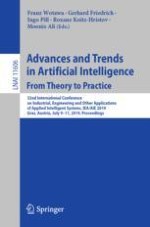2019 | OriginalPaper | Buchkapitel
User-Adaptive Preparation of Mathematical Puzzles Using Item Response Theory and Deep Learning
verfasst von : Ryota Sekiya, Satoshi Oyama, Masahito Kurihara
Erschienen in: Advances and Trends in Artificial Intelligence. From Theory to Practice
Aktivieren Sie unsere intelligente Suche, um passende Fachinhalte oder Patente zu finden.
Wählen Sie Textabschnitte aus um mit Künstlicher Intelligenz passenden Patente zu finden. powered by
Markieren Sie Textabschnitte, um KI-gestützt weitere passende Inhalte zu finden. powered by
